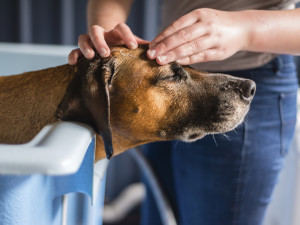Certain Flea and Tick Meds Can Cause Adverse Reaction in Pets, FDA Warns
Some preventatives have been linked to neurological issues, like stumbling, seizures, and twitching in dogs and cats. Here’s what you need to know.

share article
Concerned about your pet’s flea and tick meds? Learn more about the FDA’s announcement on the potential side effects of popular flea and tick medications.
The Food and Drug Administration (FDA) is warning pet parentsopens in a new tab about a potential risk of seizures in dogs and cats that are treated with certain flea and tick products. The products, which are in a class called isoxazolines, include Bravecto, Credelio, and Nexgard. The risk of neurological problems is higher in pets with histories of seizures or neurological disorders. The FDA is continuing to investigate the potential risk of neurological problems associated with isoxazoline products. Pet parents should talk to their veterinarians about the risks and benefits of using these products.
Bravecto, Nexgard, and Credelio are part of the isoxazoline class of drugs; isoxazoline is a pesticide. The FDA noted that most dogs and cats have not had adverse reactions to these drugs and that they continue to be safe and effective for most animals. The agency is urging veterinarians to use their specialized training to review their patients’ medical histories and determine, in consultation with pet parents, whether a product in the isoxazoline class is appropriate for their pet.
Although FDA scientists carefully evaluate an animal drug prior to approval, there is the potential for new information to emerge after going to market, when the product is used in a much larger population. In the first three years after approval, the FDA pays particularly close attention to adverse event reports, looking for any safety information that could emerge.
What kinds of adverse reactions have been reported?
If you give your dog or cat the flea and tick preventatives Bravecto, Nexgard, or Credelio, the FDA wants you to be aware that these medications may cause neurological issues like stumbling, seizuresopens in a new tab, and twitchingopens in a new tab in your pet. Although these products are FDA-approved, data received by the agency as part of its post-market activities showed the potential for adverse neurological events, and the FDA is calling for manufacturers to include clearer labels that call out these issues.
Nexgard
Nexgard is an oral monthly preventative for dogs that kills fleas and ticks. Nexgard Plus has additional ingredients that also protect dogs from heartworm disease, roundworms, and hookworms. Both formulations contain the active ingredient afoxolaner, which is a member of the isoxazoline class of drugs. Nexgard Combo is a monthly topical preventative for cats. It protects cats against fleas, ticks, heartworms, roundworms, hookworms, and tapeworms. Side effects of Nexgard include:
Vomiting
Diarrhea
Dry, flaky skin
Hair change at the application site (in Nexgard Combo for cats)
Isoxazoline-associated signs (muscle tremors, ataxia, seizures)
Bravecto
Bravecto comes in both oral and topical formulations for dogs and each dose offers 12 weeks of protection against fleas and ticks. There is also a one-month formulation for growing puppies. Bravecto only comes in topical formulations for cats — one for fleas and ticks only and another (Bravecto Plus), which also protects against heartworms and combats roundworms and hookworms. Bravecto side effects include:
Vomiting
Decreased appetite
Pruritus/itching (in Bravecto 1-Month for Dogs and both cat formulations)
Diarrhea
Alopecia (in cat formulations)
Isoxazoline-associated signs (muscle tremors, ataxia, seizures)
Elevation in the liver enzyme ALT (in Bravecto 1-Month for Dogs and Bravecto Plus for Cats)
Credelio
Credelio is a chewable monthly preventative that protects pets against fleas and ticks. There are formulations available for both dogs and cats. Side effects of Credelio include:
Weight Loss
Diarrhea
Tachypnea/rapid breathing (cats only)
Isoxazoline-associated signs (muscle tremors, ataxia, seizures)
Elevations in the kidney enzyme BUN (only seen in geriatric pets)
How can I ensure my pet’s safety when using flea and tick medications?
When choosing flea and tick prevention for pets, the first step should be to consult with a veterinarian. Your vet can take into account your pet’s speciesopens in a new tab, age, size, lifestyle, and medical history to help you choose an option that is both safe and effective. If your pet already has a history of seizures or neurological disease, your vet may recommend using a preventative that does not contain drugs in the isoxazoline class.
While all these potential adverse effects can sound scary, it’s important to remember that the incidence of these side effects is very low. Most dogs and cats on these preventatives don’t have any issues. If your dog or cat is already on one of these products and has not experienced any side effects, it’s unlikely that they will need to change medications. Your dog or cat is more at risk of developing serious infections if they’re not effectively protected from internal and external parasites. Heartworm disease, tick borne disease, and flea-related conditions are prevalent in the United States and proper protection is a part of being a responsible pet parent.
Are there alternative methods for flea and tick control?
Flea and tick preventatives come in many formulations, including oral, topical treatments, and collars. There are multiple effective products that have different active ingredients. If reading about the side effects of flea and tick medication that contain isoxazolines gives you the heebie jeebies, know that there are other products to choose from. While some pet parents may be on the hunt for natural alternatives,opens in a new tab not all are safe or effective. Talk to your vet to find a preventative that you’re comfortable with. They can guide you to the safest flea treatmentopens in a new tab.
To report suspected adverse drug events for these products and/or obtain a copy of the Safety Data Sheet (SDS) or for technical assistance, contact the appropriate manufacturers at the following phone numbers:
Merck Animal Health (Bravecto): 800-224-5318
Elanco Animal Health (Credelio): 888-545-5973
Merial (Nexgard): 888-637-4251
FAQs (people also ask):
Should I stop using flea and tick medications on my pet altogether?
Do not stop using fleas and tick medications on your pets. Fleas and ticksopens in a new tab carry diseases, so protecting your pets from infestations is important. Talk to your vet to find a product that you’re comfortable with.
Is there ongoing research into this issue?
The FDA monitors reports of adverse drug events and encourages pet parents and veterinarians to report any incidents. Researchers continue to gather data and publish findings in veterinary journals.
Where can I report adverse reactions to pet medications?
You or your veterinarian can report drug reactions to the drug’s manufacturer, which is required to report it to the FDA, or report them directly to the FDA. Additional information on how to report drug side effects in animals can be found hereopens in a new tab.
How can I stay updated on pet medication safety information?
Pet medication safety information can be found on drug manufacturer websites, as well as on the FDA website. The FDA also provides an updated list of product recalls, market withdrawals, and safety alerts. This list can be filtered by product type.
Resources:

Dr. Alycia Washington, DVM, MS
Alycia Washington, DVM, is a small animal emergency veterinarian based in North Carolina. She works as a relief veterinarianopens in a new tab and provides services to numerous emergency and specialty hospitals. Dr. Washington is also a children’s book author and freelance writer with a focus on veterinary medicine. She has a special fondness for turtles, honey bees, and penguins — none of which she treats. In her free time, Dr. Washington enjoys travel, good food, and good enough coffee.
Related articles
![Cute weimaraner dog lying on lawn and scratching its back]() opens in a new tab
opens in a new tab5 of the Best Ways to Solve Your Dog’s Allergies
Here’s what works (and what doesn’t).
![puppy scratching fleas, get rid of fleas on dogs]() opens in a new tab
opens in a new tabHome Remedies For Getting Rid of Fleas on Dogs—Naturally
You can stop your home from becoming a literal flea circus.
![Black puppy itches behind her ear due to flea allergy]() opens in a new tab
opens in a new tabShoo, Flea: What to Do About Your Dog’s Disturbing Flea Allergy
Before you say “ewww” Moira Rose-style, learn these steps to prevent and remove fleas.
![Woman holding a beagle in warm dappled summer light]() opens in a new tab
opens in a new tabYou’ve Got a Summer-Lovin’ Pup. Here’s How to Keep Them Safe
Some like it hot (but not most dogs). Here are the season’s health hazards, from fleas to foxtails.
![A woman checking out her dogs paw.]() opens in a new tab
opens in a new tabHere’s Where Disease-Carrying Ticks Are in the US—And How to Keep Your Pup Safe
Simple preventive steps can go a long way toward offsetting their threats.
![A dog getting its head checked for ticks]() opens in a new tab
opens in a new tab5 Myths About Ticks That Every Dog Parent Should Know
Found a tick on your dog? A veterinarian breaks down everything you need to know.








